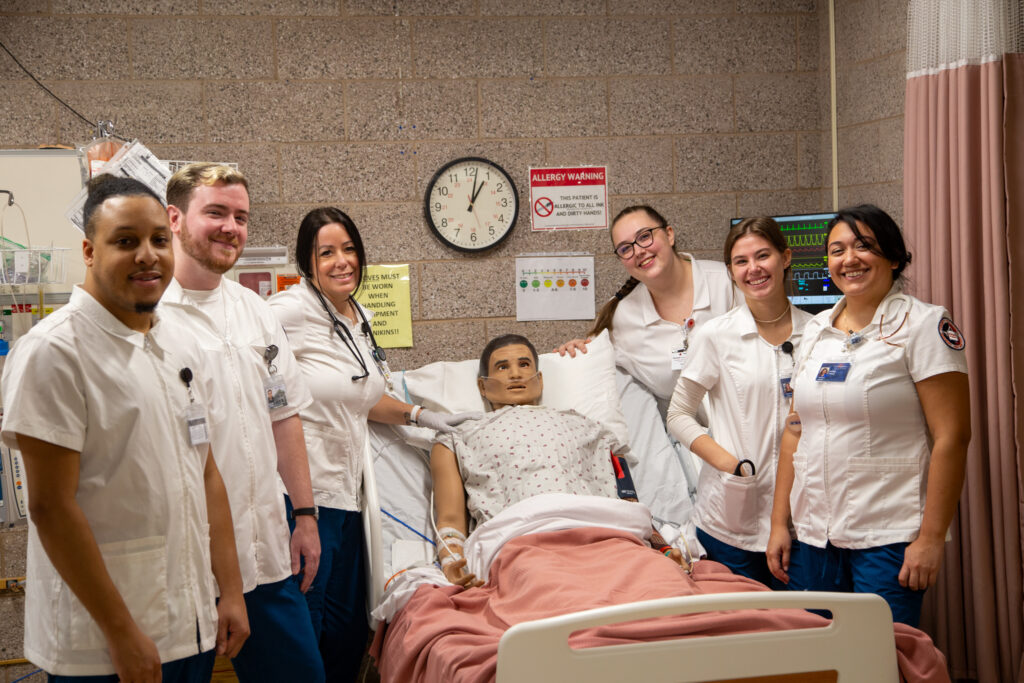MIDDLETOWN- In September, State University of New York Chancellor John B. King Jr. announced the formation of a system-wide task force to address the shortage of healthcare workers across New York State. The Hudson Valley, with its vast network of healthcare providers, is itself impacted by the dearth of available personnel.
While SUNY is working to address the problem statewide, with an assist from Task Force appointee Donna Frazier of the College’s Occupational Therapy Assistant Department, SUNY Orange continues to provide this region with qualified and skilled graduates, most of whom remain in the Hudson Valley to live and work.
Long renowned for its highly competitive and successful health professions degree programs, most specifically its nursing curriculum that was the first two-year nursing degree in the nation, SUNY Orange attracts students who are also interested in careers within dental hygiene, occupational technology assistant, medical laboratory technician, physical therapist assistant, and radiologic technology.
Moreover, SUNY Orange also provides degrees in human services and public health, and recently introduced a healthcare administration program. Understanding there are individuals in the community actively looking to enhance or acquire new skills to advance or jump-start careers, SUNY Orange also offers short-term workforce certification programs in CASAC (Credentialed Alcohol and Substance Abuse Counselor) and certified pharmacy technician, as well as accredited programs in phlebotomy, clinical medical assistant, medical billing and coding, emergency medical technician (EMT), and more. All of these new certifications lead to strong employment and ideal wages.
While most degree programs prepare students for direct care careers, the healthcare administration program, for example, can lead to a rewarding career for those who don’t want to work in a clinical or patient care setting. It is primarily designed for students who will continue their education at a four-year college or university where they may pursue a bachelor’s degree in a variety of areas, including management, marketing, finance, or human resource management.
“Over decades, SUNY Orange has built a strong reputation for training and educating competent and skilled graduates in the health sciences,” said Dr. Erika Hackman, SUNY Orange provost. “But as the healthcare sector grows, there are becoming more ways for people to serve their community. Our healthcare administration degree will provide a different pathway into healthcare employment.”

In forming the SUNY task force, Chancellor King reported Bureau of Labor Statistics data that shows overall employment in health care occupations is also projected to grow much faster than the average for all occupations through 2031.
Stringent accreditation standards for many of SUNY Orange’s health professions programs lay out a rigorous degree-specific curriculum designed to assure graduates are well-prepared and proficient. In recent weeks, as several licensing bodies have released test results, SUNY Orange’s graduates have impressed.
Each of the 17 members of the dental hygiene program’s Class of 2023 passed both the National Board Dental Hygiene Examination (NBDHE) and the CDCA-WREB Clinical Board on their first attempts.
Similarly, all 10 of the 2023 SUNY Orange Radiologic Technology program graduates passed their American Registry of Radiologic Technologists (ARRT) national board exam on their first attempt. The most recent national averages, from 2018 through 2022, show the rad tech program’s first-time pass rate average at 91.8 percent, outpacing the national average of 86.8 percent during that same period.

Recent nursing graduates far exceeded state and national averages on the National Council Licensure Examination (NCLEX), with 92.3 percent of the College’s alumni who took the exam in 2023 passing on the first attempt. The national pass rate for associate degree programs was 90 percent while the New York State pass rate was 85.6 percent.
In hopes of ultimately sending more graduates into the healthcare sector, SUNY Orange has used one-time supplemental funding from SUNY to investigate the possible expansion of its nursing program by 24 seats on the Newburgh campus, as well as ways to enhance the radiologic technology and public health programs on the Middletown campus.
For decades, SUNY Orange has provided an affordable and accessible education to support residents of Orange County and the Hudson Valley in reaching their goals across countless industries and sectors, and the College will continue to rely upon its rich history within the health professions to help this region in its time of need.








